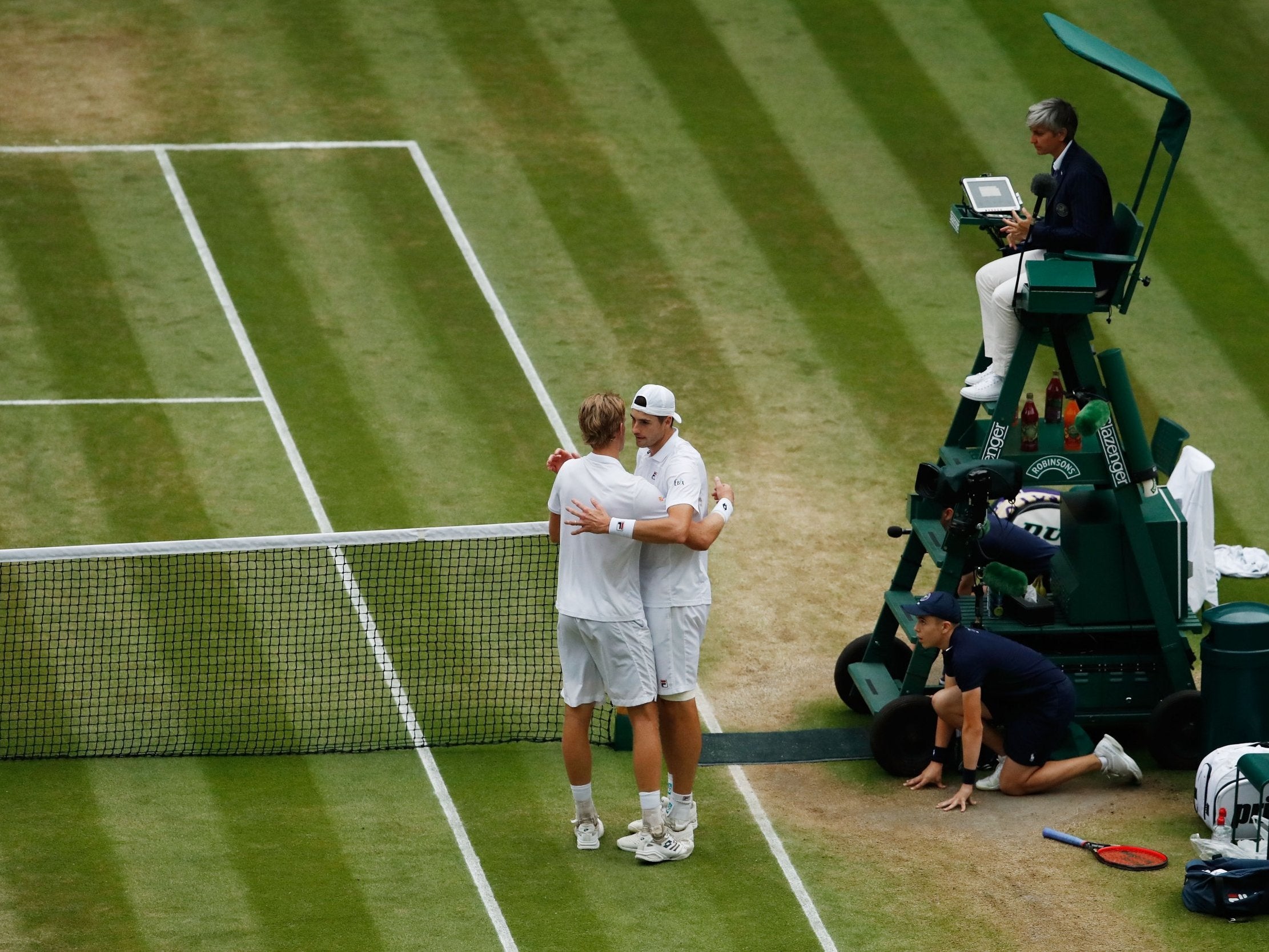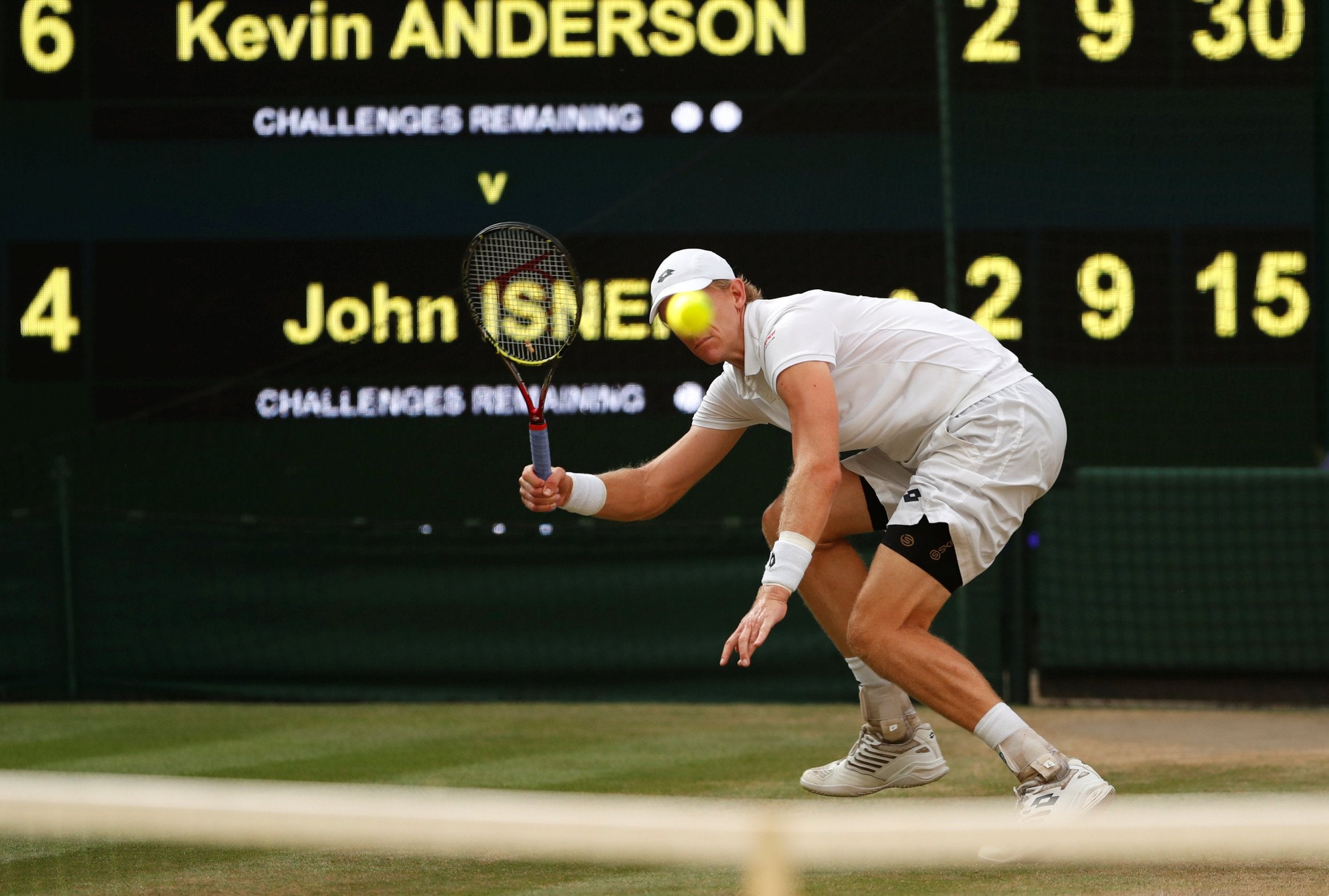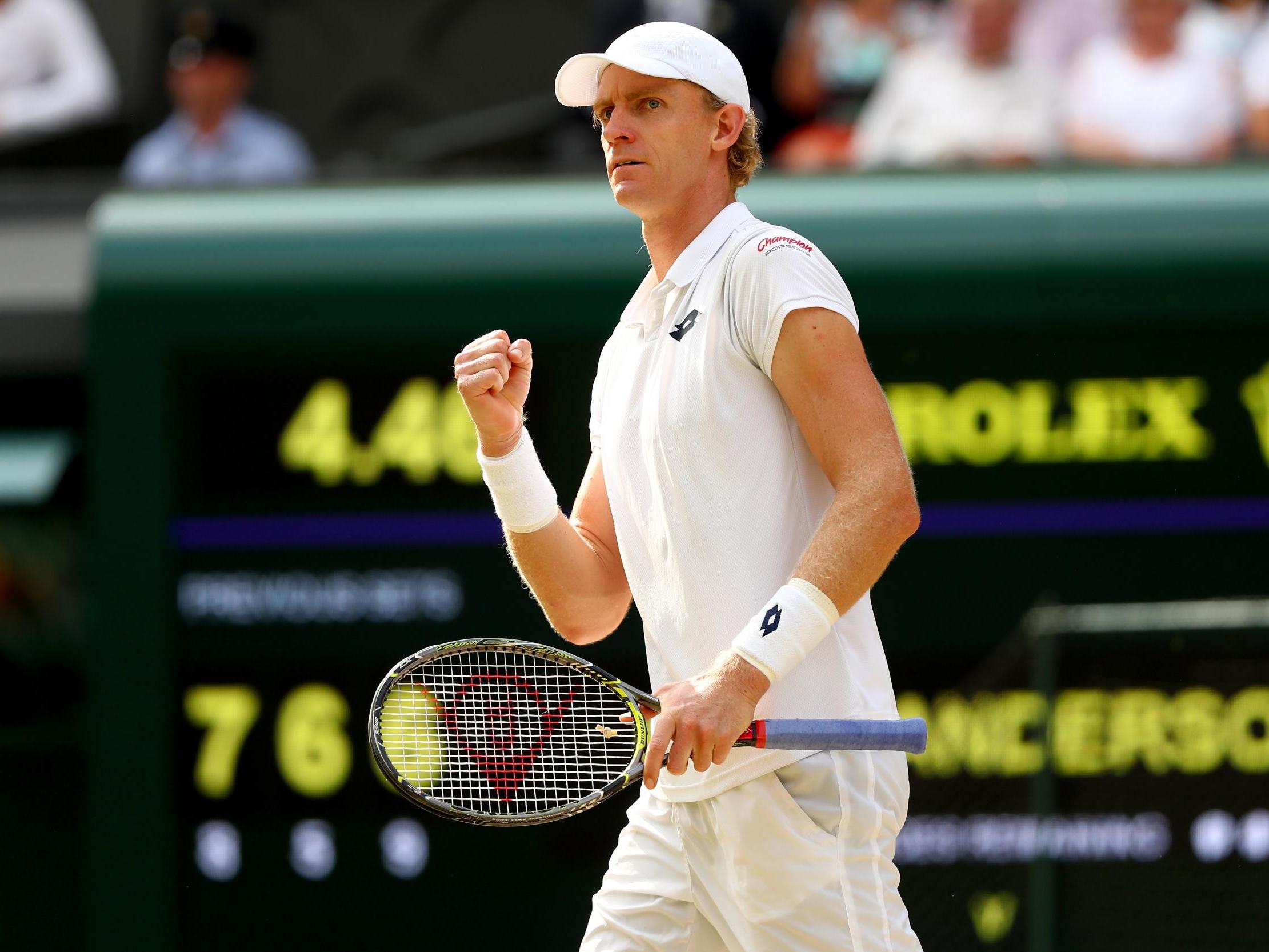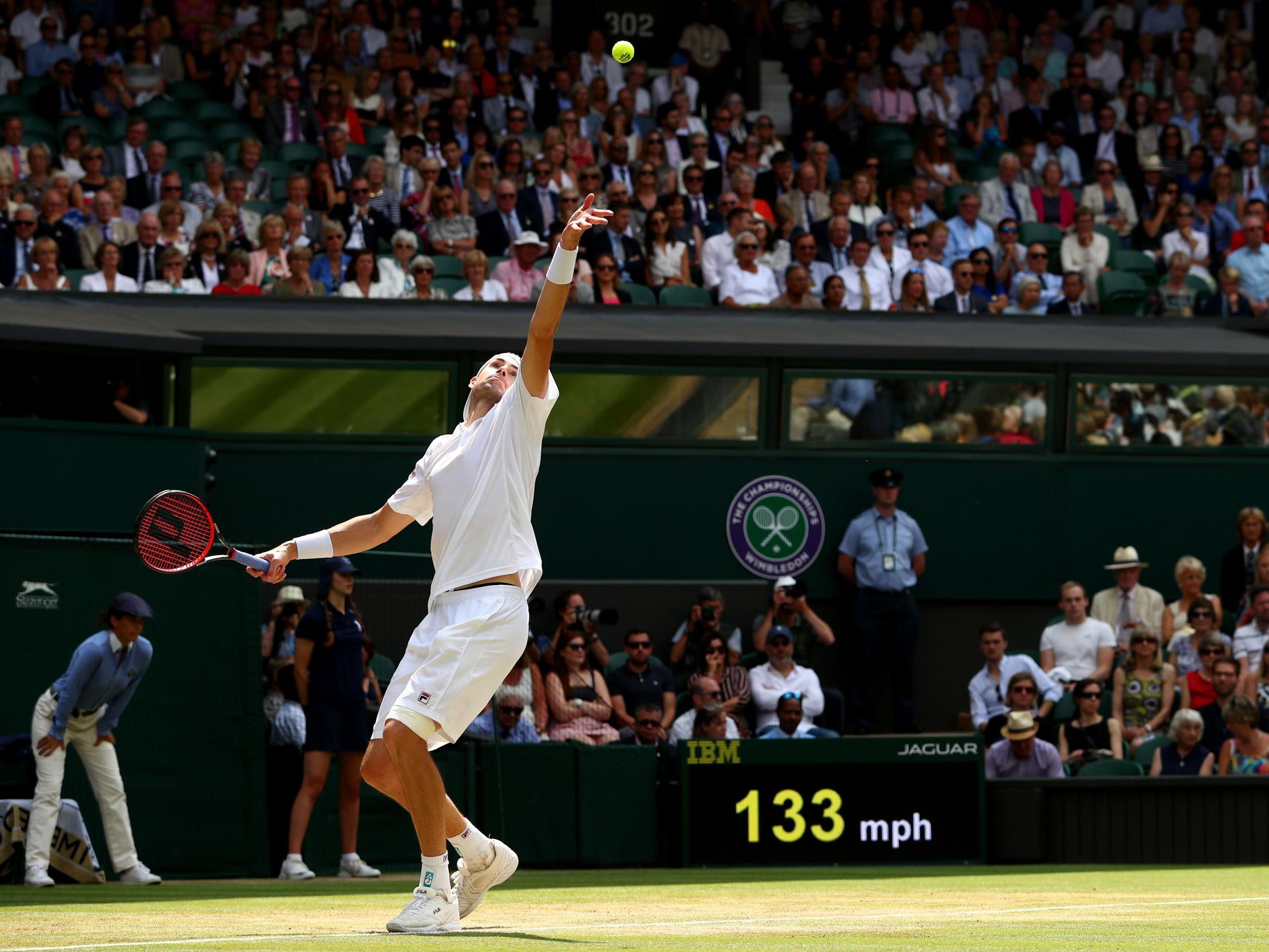Wimbledon 2018: Kevin Anderson beats John Isner in five-set Centre Court marathon to reach first SW19 final
Isner recovered from 0-30 down on six occasions, at 7-7, 9-9, 10-10, 21-21, 22-22 and 23-23, but at 24-24 his resistance finally ended

Your support helps us to tell the story
From reproductive rights to climate change to Big Tech, The Independent is on the ground when the story is developing. Whether it's investigating the financials of Elon Musk's pro-Trump PAC or producing our latest documentary, 'The A Word', which shines a light on the American women fighting for reproductive rights, we know how important it is to parse out the facts from the messaging.
At such a critical moment in US history, we need reporters on the ground. Your donation allows us to keep sending journalists to speak to both sides of the story.
The Independent is trusted by Americans across the entire political spectrum. And unlike many other quality news outlets, we choose not to lock Americans out of our reporting and analysis with paywalls. We believe quality journalism should be available to everyone, paid for by those who can afford it.
Your support makes all the difference.John Isner may be Wimbledon’s ultimate marathon man but for this year at least Kevin Anderson has taken over the American’s reputation as its most durable competitor.
Two days after beating Roger Federer 13-11 in the fifth set, the 32-year-old South African reached his first Wimbledon final by beating Isner 7-6, 6-7, 6-7, 6-4, 26-24 after six hours and 36 minutes in the second longest singles match in All England Club history.
Longest matches in Wimbledon history
1 – First round, 2010. John Isner beat Nicolas Mahut (France) 6-4 3-6 6-7(7) 7-6(3) 70-68 – 11hrs 5 mins (record for longest match ever at any venue)
2 – Semi-final, 2018. Kevin Anderson (South Africa) beat Isner 7-6(6) 6-7(5) 6-7(9) 6-4 26-24 – 6hrs 36mins
3 – Third round, 2012. Marin Cilic (Croatia) beat Sam Querrey (U.S.) 7-6(6) 6-4 6-7(2) 6-7(3) 17-15 – 5hrs 31mins
4 – Second round, 1989. Greg Holmes (U.S.) bt Todd Witsken (U.S.) 5-7 6-4 7-6(5) 4-6 14-12 – 5hrs 28mins
5 – First round, 1969. Pancho Gonzales (U.S) bt Charlie Pasarell (U.S) 22-24 1-6 16-14 6-3 11-9 – 5hrs 12mins
Anderson will play his first Grand Slam final against Rafael Nadal or Novak Djokovic, who after waiting all afternoon for the first semi-final to finish finally started at 8.08pm. The Centre Court roof was closed before the start in order to ensure that neither rain nor bad light would interrupt the match, though the All England Club does not have local authority permission to play beyond 11pm.
The first semi-final passed a succession of landmarks. After five hours and 12 minutes it beat the record for the longest Centre Court singles match (Pancho Gonzales’ victory over Charlie Pasarell in 1969) and after five hours and 31 minutes it became the second longest Wimbledon match ever following Marin Cilic’s victory over Sam Querrey in 2012.
The only longer match was Isner’s 6-4, 3-6, 6-7, 7-6, 70-68 victory over Nicolas Mahut in the first round in 2010, which at 11 hours and five minutes is the longest match ever played anywhere. It took three days to complete, whereas Anderson-Isner will go down as the longest Wimbledon match completed in a single day.
After six hours and 33 minutes Anderson-Isner also became the second longest match at any Grand Slam tournament, replacing the 2004 French Open match between Arnaud Clement and Fabrice Santoro.
Anderson was close to tears in his post-match interview. “I don’t really know what to say right now,” he said. “Playing like that in those sort of conditions was really tough on both of us. At the end you feel like this is a draw between the two of us, but somebody has to win.
“John is such a great guy and I really feel for him. If I’d been on the opposite side I don’t know how you can take that playing for so long and coming out short. I apologise if I’m not more excited right now, but there are so many mixed emotions. Getting through something like that is quite different.”

Anderson, who has been a friend of Isner’s since they played college tennis, said he was not sure how he would recover in time for Sunday’s final. “I really hope that this is a bit of a sign for Grand Slams to change this format over five sets,” he said. “I really hope we can look at this and address it. At the end you don’t even feel that great out there.”
The match was a serving master class between two huge servers. Isner, who stands 6ft 10in tall, served at up to 142mph and hit 53 aces. Anderson, who is 6ft 8in, hit a fastest serve of 137mph and struck 49 aces. Of the 569 points played, only 16 were break points; Anderson won four of his 11 while Isner won two out of his five.
Although it took more than six and a half hours to separate the two men, Anderson deserved his victory. The world No 8, who lost to Nadal at the US Open last summer in his first Grand Slam final, always looked the more likely player to win the final set. Having never gone beyond the fourth round here in his 10 previous visits, he will become the first South African to play in the men’s singles final since Brian Norton in 1921.
When Isner forced three break points in only the third game – and went close to converting each of them – it seemed possible that this might not become the big-serving marathon that had been anticipated, but those early signs were misleading.

Anderson had only one break point in the opening set, which Isner saved with a 129mph second serve at 4-5, and went on to win the tie-break 8-6 after saving one set point with a smash.
The second set featured only one break point, which Isner saved at 4-4 with a volleyed winner. The American raced into a 5-0 lead in the tie-break, was pegged back to 6-5 as Anderson saved two set points but then levelled the match with an ace.
In the third set, after two hours and 27 minutes and 206 points, we finally witnessed the first break of serve as Anderson became the only man to break Isner at Wimbledon this year. The first man to reach the semi-finals without dropping his serve since such records began in 1992, Isner had won 110 service games in a row from the start of the tournament, but at 3-4 he succumbed under a barrage of attacking shots.
Just like London buses, however, another break followed immediately. Taking a leaf out of Anderson’s book, Isner went on all-out attack in the next game as the South African served for the set and was rewarded with his first break.

The third set might have taken a circuitous route but it arrived at a familiar destination with a tie-break. Both men saved two set points before Isner’s attacking return forced Anderson into a missed forehand as the American took the tie-break 11-9.
At 2-2 in the fourth set Anderson again drew first blood, breaking serve by winning four points in a row from 40-15 down. Remarkably enough, however, Isner repeated his feat of the previous set by breaking back immediately, only to drop serve again at 4-4.
When Isner recovered from 40-0 down to deuce as Anderson served for the set in the following game the South African might have wondered whether lightning was about to strike for the third time, but he held firm to serve out and level the match.
Anderson repeatedly had to serve to stay in the match in the deciding set, as he had against Federer, but did not have to defend any match points. There were no break points in the set until Isner saved one with an ace at 7-7. The American saved another at 10-10 and two in a row at 17-17 with successive aces.

Isner recovered from 0-30 down on six occasions, at 7-7, 9-9, 10-10, 21-21, 22-22 and 23-23, but at 24-24 his resistance finally ended. Anderson went 0-30 up despite falling on to his back in the middle of the rally and having to hit his next shot left-handed. He then hit a forehand cross-court winner to create three more break points and took the second of them when Isner netted a backhand.
When Anderson served for the match he lost the first point but won the next four, Isner missing a forehand on the first match point. The two men embraced at the end but Anderson was so drained – and clearly felt so sorry for his opponent – that he could not even bring himself to smile.
Asked about his left-handed forehand in the final game, Anderson said: “At that stage you’re just trying to fight at every single moment. It was like, just get up. I’ve hit a lot of left-handed balls throughout my life. I had surgery when I was quite young and my dad, who coached me when I was growing up and throughout my career, he was like: ‘Let’s play left-handed.’
“I didn’t know that was going to come into play at this stage of my career, but that was obviously a vital point for me in the end.”
Anderson hit 49 aces and 118 winners in the epic contest on Centre Court. He plays Rafael Nadal or Novak Djokovic in Sunday’s title clash.
Join our commenting forum
Join thought-provoking conversations, follow other Independent readers and see their replies
Comments